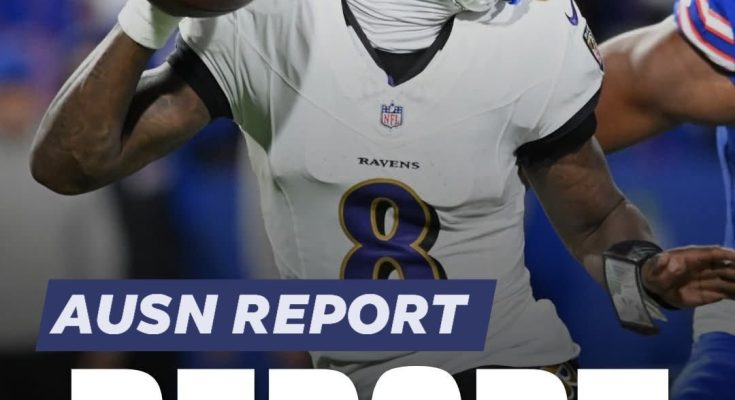The tension in the fourth quarter of that game was palpable. Every second on the clock felt stretched thin, every play magnified under the pressure of what was at stake. For the Baltimore Ravens, it was a moment that could define the trajectory of their season, a chance to cement themselves as contenders or face the bitter reality of missed opportunity. The decision that fell into the hands of John Harbaugh, the Ravens’ head coach known for his calculated risk-taking and steady leadership, would echo far beyond that day’s final whistle.
As the clock ticked down and the Ravens found themselves facing a 4th-and-3 situation at midfield, the conventional wisdom, the coaches’ instincts, and the crowd’s yearning all converged into a critical crossroads. Should Harbaugh push his chips to the center, trust his offense to gain the needed yardage and sustain the drive, or should he play it safe, punt the ball away, and put the onus back on his defense to hold the line? This was no ordinary decision—it was a choice between aggression and caution, between seizing control and hoping to limit the opponent’s opportunities.
Harbaugh, renowned for his bold calls throughout his career, surprisingly opted not to go for it. Instead, the Ravens punted, relinquishing possession to the Buffalo Bills and their formidable quarterback, Josh Allen. This choice was not made lightly, of course. Harbaugh and his coaching staff had likely weighed all the variables—the game’s context, their confidence in the defense, the potential risks of turning the ball over, and the probability of converting on 4th-and-3. But in the end, the cautious path was chosen, a decision that many would debate for weeks after.
The decision proved to be pivotal. Once Allen and the Bills took over, the momentum swiftly shifted. Allen, known for his electrifying athleticism, strong arm, and clutch performances, orchestrated a determined drive down the field. The energy in the stadium shifted palpably as the Bills moved methodically, balancing quick passes and hard runs, exploiting the Ravens’ defensive vulnerabilities. The Ravens defense, which had held strong for much of the game, struggled to contain Allen’s dynamic playmaking.
Ultimately, Allen’s drive culminated in a game-winning score that sealed the fate of the contest. The Ravens’ earlier decision to punt rather than attempt to convert on 4th-and-3 became the focal point of post-game analysis and criticism. Fans, analysts, and reporters dissected the moment, debating whether Harbaugh had missed a chance to seize control or whether the choice was justified given the circumstances.
Josh Tolentino, a reporter with the Baltimore Sun who covered the game extensively, offered insight into the moment and its significance. Tolentino’s reporting captured the gravity of the situation and the ripple effects of the decision on the Ravens’ season. According to Tolentino, had the Ravens opted to go for it and succeeded, they might have changed the game’s complexion entirely, possibly leading to a victory rather than a defeat.
The 4th-and-3 call is emblematic of the split-second decision-making inherent in football coaching, where every choice carries weighty consequences. Harbaugh’s reputation as a strategic thinker and his history of successful risky plays made the punt choice somewhat surprising, intensifying scrutiny of his judgment that day. Analysts pointed out that the Ravens’ offense had been performing well, suggesting the odds might have favored an aggressive call to keep the ball and the drive alive.
Conversely, defenders of Harbaugh’s choice highlighted the defensive strength Baltimore possessed and the rationale of forcing the Bills to score under pressure. They argued that punting and relying on the defense was a sound strategic decision based on the game’s flow and the overall risk-reward calculation.
The game itself was a thriller, a battle of wills between two talented teams hungry for a crucial win. The Ravens entered the game with high expectations, their roster stacked with playmakers and a coaching staff known for preparation and adaptability. The Bills, led by Allen, were equally determined, eager to prove their mettle and assert themselves in the fiercely competitive league.
Throughout the contest, both teams traded blows, with momentum swinging back and forth. The Ravens’ defense played tough, at times stifling the Bills’ offense and forcing turnovers. Meanwhile, Baltimore’s offense showcased moments of brilliance, mixing power runs with precision passing. Yet, as the clock wound down, it was the decision on 4th-and-3 that stood as a defining juncture.
Tolentino’s coverage highlighted how the crowd’s energy shifted after the punt. What had been a hopeful atmosphere for the Ravens turned into a tense, almost anxious anticipation as the Bills began their final march. Allen, a quarterback with a flair for the dramatic, rose to the occasion, moving his team efficiently and methodically. His leadership on that drive was a testament to his growth as a player and his ability to perform under pressure.
For Ravens fans, the outcome was a bitter pill to swallow. The team had come close to victory, only to have it slip away in the final moments. The decision not to go for it on 4th-and-3 became a focal point for reflection and debate. It sparked conversations not only about that specific game but about coaching philosophies and the delicate balance between risk and prudence in football.
In the aftermath, Harbaugh himself acknowledged the difficulty of the decision. Coaches rarely regret a call in isolation, as football is a team sport with countless moving parts, but moments like these become etched in memory. The pressure on coaches to weigh every variable and anticipate every possible outcome is immense. And while some fans and commentators may criticize a punt, others recognize that every decision comes with inherent risks.
The game’s conclusion also reinforced Josh Allen’s status as one of the league’s premier quarterbacks. His composure, arm strength, and ability to extend plays were on full display, underscoring why he is considered a franchise cornerstone for the Bills. His drive to win that game was emblematic of his competitive spirit and the high stakes of NFL competition.
Looking forward, the Ravens would need to process the lessons from this game and the decisions that defined it. Football seasons are often shaped by such pivotal moments—turning points that either galvanize a team or expose areas for growth. How the Ravens respond to this defeat and the choices around it could influence their trajectory for the remainder of the season.
The game also serves as a case study in coaching strategy and the fine margins that separate victory from defeat. For fans of the sport, it is a reminder of how unpredictable and thrilling football can be, where a single call on a 4th-and-short can determine the outcome and become the subject of extensive analysis and debate.
Josh Tolentino’s reporting brought these nuances to light, providing readers with a deeper understanding of the game’s dynamics and the factors influencing Harbaugh’s decision. His insights into the team’s mindset and the unfolding of events helped frame the story beyond just the final score, emphasizing the human element behind every play call and the passion that drives players and coaches alike.
In the end, while the Ravens’ punt on 4th-and-3 may be remembered as a turning point, it also highlights the complexity and drama that make football such a compelling sport. The choice between going for it and playing it safe is never easy, and the outcomes are never guaranteed. This moment, captured vividly through Tolentino’s coverage and the game’s narrative, will remain a talking point for Ravens fans and football enthusiasts for seasons to come.



